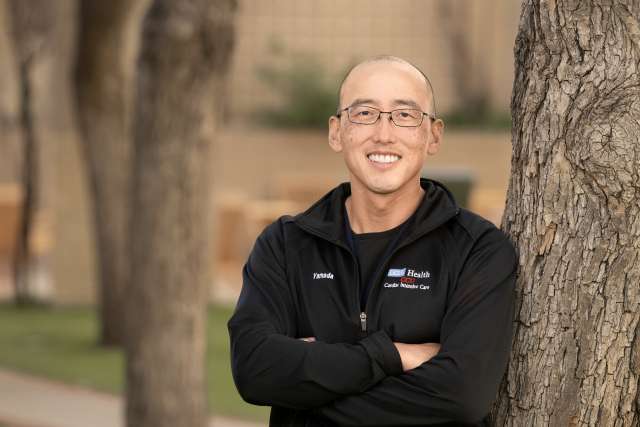One might say that David Yamada’s life has been shaped by a series of defining moments.
One of the most pivotal came one morning while on his way to work as an accountant: He was involved in a car accident with a nurse coming off her night shift.
Yamada was in the fast lane of the freeway, traveling at 50 mph, he recalls. As the nurse entered the freeway, her car clipped a DHL truck, spinning her vehicle into Yamada’s lane and hitting him head-on. Fortunately, no one was seriously hurt.
“It totaled my car, but I escaped with a cut lip. She hit her head on the steering wheel but was OK,” he says.
Yamada, then 24, had a deadline to meet, and he remembers being upset he would be late to work. But later, reflecting on the accident, he started pondering the fragility of life, about “how you can be doing everything right, but something can happen, and it can be taken away at any time.”
“It started me wondering, ‘Why am I here in a job I don’t like … where I wasn’t feeling passionate or loving it … where I felt my soul was dying?’ ” Yamada says.
Three weeks later, Yamada submitted his resignation and embarked on a quest to find a fulfilling career.
“Long story short,” he says, “nursing won.”
Making connections
Fast-forward 18 years. Yamada, an RN, is now a clinical nurse in 7CCU, the coronary critical care unit at Ronald Reagan UCLA Medical Center, where he’s worked for the past 14 years. It’s a role he believes he was meant for; one that allows him to wear multiple hats, whether teaching a patient about medications or lifestyle changes, talking with family members about stress reduction, or having sensitive, end-of-life conversations with patients and their families.
“I love nursing because, especially in the ICU bedside, we get to be there at those crossroads in people’s lives,” Yamada explains. “We have a chance to connect with them and, potentially, have a profound impact on them and their family’s life, and it’s such a privilege.”
Prioritizing nurses
Yamada grew up in Japan and spent most of his childhood moving between Tokyo and California, attending schools in both locations. He credits his upbringing for giving him a flexible understanding of the world.
“Going back and forth was stressful, but it widened my viewpoints and taught me that there is more than one way to think about and do things,” he says.
That ability to see things from multiple perspectives may be one reason he’s been successful in his role as chief nurse representative for the California Nurses Association. Since 2017, Yamada has dedicated hundreds of hours of his personal time to prioritizing the safety and well-being of his fellow nurses.
Yamada credits serendipity, again, for leading him down that path.
“I was around eight years into my career, just going to work, blissfully ignorant, and I was happy like that until one day I got tapped to be a nurse representative on my unit,” he recalls.
Yamada didn’t know anything about unions, but he agreed to attend the monthly meeting. He soon dove into his role as nurse representative, eventually being named chief nurse representative for Ronald Reagan UCLA Medical Center. It’s a role he relishes.
”It’s my way of giving back to nurses but also to nursing as a profession and making it so I still love nursing in the future,” he says.
Recognizing greatness
Yamada’s contributions are being noticed outside of UCLA Health, as well. In 2023, he was one of 30 nurses – 10 from UCLA Heath – to be honored by the Simms/Mann Family Foundation’s , which recognizes nursing greatness.
By the program’s design, recipients embody “a bias toward action, capacity for self-direction, originality and creative instincts, courageous and bold thinking, and the potential to achieve even more.”
The award celebrates the valuable work of nurses that often goes unrecognized, Yamada says.
“What I connected to with this award is when they said, ‘recognizing nursing greatness where the value isn’t captured by traditional metrics.’ Because a lot of what bedside nurses do cannot be quantified or measured by traditional means,” he says.
Life-changing cheeseburger
In his desk, Yamada keeps what he calls a “positivity folder” where he drops notes and photos sent to him by patients. It’s his defense against career burnout, he says.
“I just open the folder, and I’m rejuvenated.”
One photo, in particular, holds a special meaning.
An 18-year-old exchange student from Europe had gone into cardiac arrest and was brought to his unit at UCLA Health. It was touch and go, but once the patient had stabilized, Yamada was responsible for her care, including removing her breathing tube.
Shortly after the tube was removed, the patient announced she was hungry, Yamada relates. After receiving approval from her physician, Yamada left for lunch, returning 30 minutes later with a bag of cheeseburgers for the patient and her mom, who snapped a photo of the exchange.
Yamada forgot about the interaction until about a year later, when the former exchange student and her mom stopped by the ICU during a family vacation.
“She showed up on one of my shifts,” Yamada recalls. “She walked in, smiling, hugged me, and handed me a laminated photo of that picture with the cheeseburger. On it, she had written, ‘Thanks for the best burger, David – my first burger after intubation.’ ”
Yamada says that simple gift profoundly changed him as a nurse.
“You never know what impact you have on people,” he says, his eyes welling up. “That story made me fall in love with nursing again. I feel like it captures the core of why nursing matters … and why I love it.”



